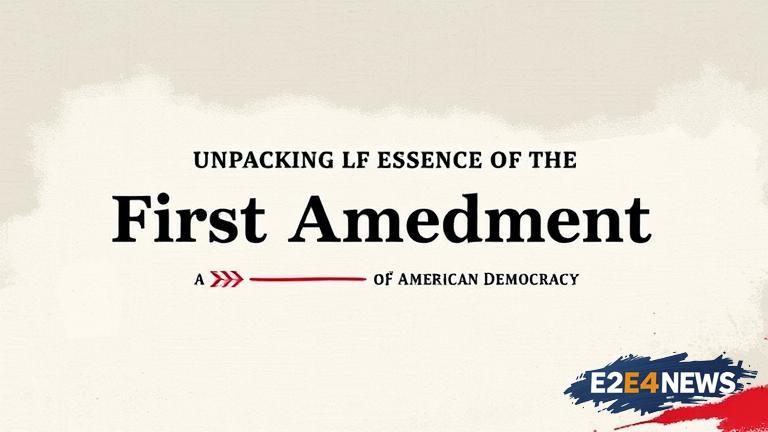The First Amendment, part of the US Constitution’s Bill of Rights, is pivotal in ensuring the freedoms that define the United States. It guarantees the freedom of speech, which is essential for the exchange of ideas and the critique of power. This freedom allows citizens to express their opinions without fear of government retribution, fostering a vibrant public discourse. The amendment also protects the freedom of religion, ensuring that individuals can practice their faith without interference from the state. This includes the freedom to worship, to assemble for religious purposes, and to express religious beliefs. Furthermore, the First Amendment safeguards the freedom of the press, which is crucial for holding those in power accountable and for informing the public about matters of public interest. A free press can investigate and report on government actions, corporate practices, and social issues, providing the public with the information necessary to make informed decisions. The freedom of assembly is another critical component, allowing citizens to come together to express their views, protest, or participate in community activities. This freedom is essential for the functioning of a healthy democracy, as it enables collective action and the expression of dissent. The right to petition the government for a redress of grievances completes the First Amendment’s protections, ensuring that citizens have a formal mechanism to address their concerns and seek change. These freedoms are not absolute, however, and the Supreme Court has established various tests and exceptions over the years to balance individual rights with societal needs and government interests. Despite these limitations, the First Amendment remains a powerful tool for protecting individual liberties and promoting democratic participation. Its importance extends beyond the legal realm, influencing cultural norms and political practices. The amendment’s emphasis on freedom of expression, for example, has contributed to the United States’ vibrant cultural landscape, where artists, writers, and musicians can create and share their work without censorship. The protection of religious freedom has also allowed for a diverse religious landscape, with individuals free to practice their faith as they see fit. The freedom of the press has been instrumental in uncovering corruption, abuse of power, and social injustices, serving as a watchdog over government and corporate actions. In times of political polarization and social change, the First Amendment’s guarantees are more crucial than ever, providing a framework for constructive debate and peaceful protest. The amendment’s protections are not limited to citizens, as they also extend to non-citizens within the United States, ensuring that everyone enjoys these fundamental freedoms. The global impact of the First Amendment should not be underestimated, as it has inspired similar protections in other countries and serves as a model for democratic governance. Despite its significance, the First Amendment faces challenges, including efforts to restrict freedom of speech, religion, and the press. These challenges often arise from concerns about national security, public safety, and social harmony, but they must be balanced against the need to protect fundamental rights. The Supreme Court plays a critical role in interpreting the First Amendment, with its decisions shaping the scope and application of these freedoms. In conclusion, the First Amendment is a cornerstone of American democracy, providing essential protections for individual freedoms and promoting a vibrant, participatory democracy. Its importance cannot be overstated, and its continued protection and interpretation are vital for the health of American society and the inspiration of democratic movements worldwide.
